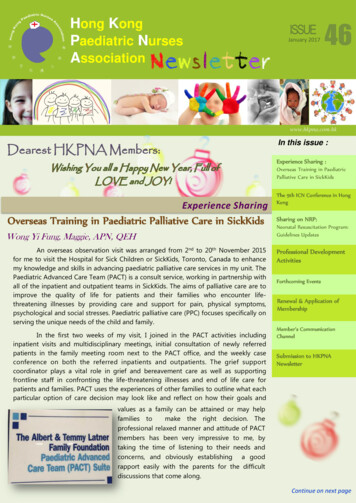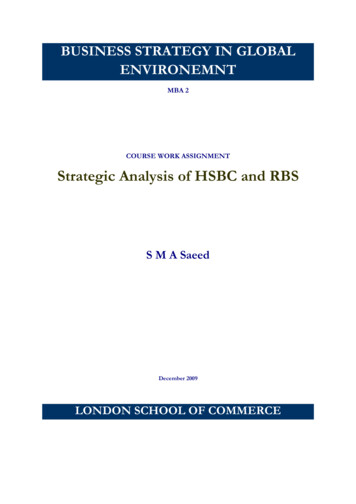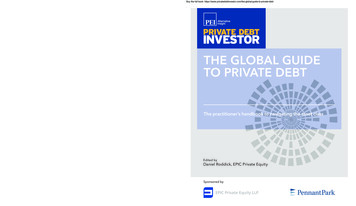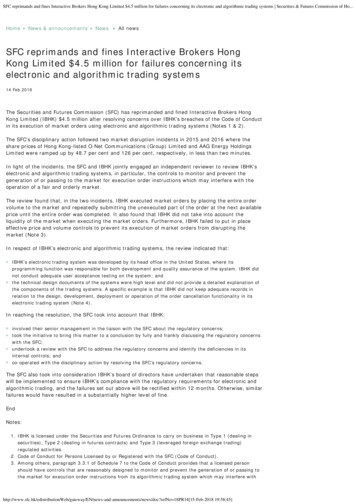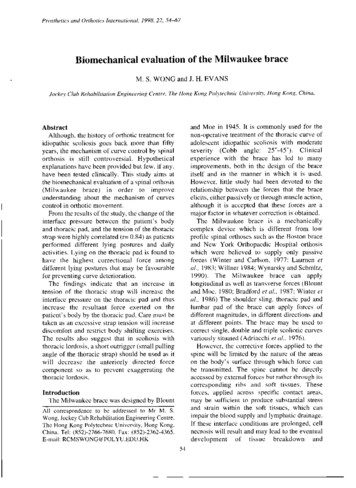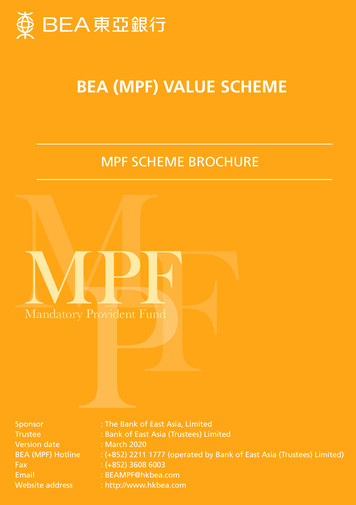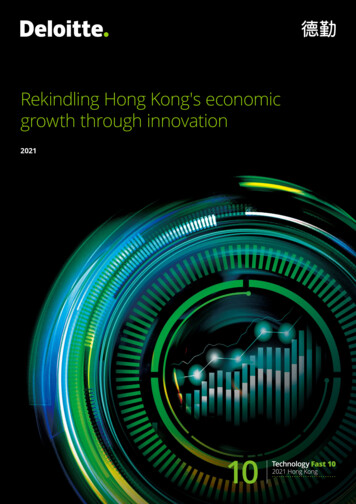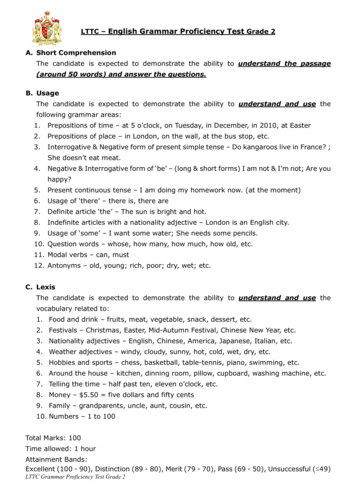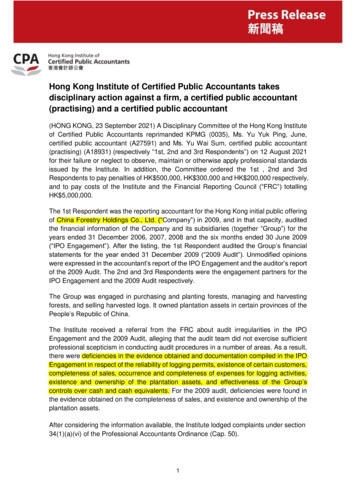
Transcription
Hong Kong Institute of Certified Public Accountants takesdisciplinary action against a firm, a certified public accountant(practising) and a certified public accountant(HONG KONG, 23 September 2021) A Disciplinary Committee of the Hong Kong Instituteof Certified Public Accountants reprimanded KPMG (0035), Ms. Yu Yuk Ping, June,certified public accountant (A27591) and Ms. Yu Wai Sum, certified public accountant(practising) (A18931) (respectively “1st, 2nd and 3rd Respondents”) on 12 August 2021for their failure or neglect to observe, maintain or otherwise apply professional standardsissued by the Institute. In addition, the Committee ordered the 1st , 2nd and 3rdRespondents to pay penalties of HK 500,000, HK 300,000 and HK 200,000 respectively,and to pay costs of the Institute and the Financial Reporting Council (“FRC”) totallingHK 5,000,000.The 1st Respondent was the reporting accountant for the Hong Kong initial public offeringof China Forestry Holdings Co., Ltd. (“Company”) in 2009, and in that capacity, auditedthe financial information of the Company and its subsidiaries (together “Group”) for theyears ended 31 December 2006, 2007, 2008 and the six months ended 30 June 2009(“IPO Engagement”). After the listing, the 1st Respondent audited the Group’s financialstatements for the year ended 31 December 2009 (“2009 Audit”). Unmodified opinionswere expressed in the accountant’s report of the IPO Engagement and the auditor’s reportof the 2009 Audit. The 2nd and 3rd Respondents were the engagement partners for theIPO Engagement and the 2009 Audit respectively.The Group was engaged in purchasing and planting forests, managing and harvestingforests, and selling harvested logs. It owned plantation assets in certain provinces of thePeople’s Republic of China.The Institute received a referral from the FRC about audit irregularities in the IPOEngagement and the 2009 Audit, alleging that the audit team did not exercise sufficientprofessional scepticism in conducting audit procedures in a number of areas. As a result,there were deficiencies in the evidence obtained and documentation compiled in the IPOEngagement in respect of the reliability of logging permits, existence of certain customers,completeness of sales, occurrence and completeness of expenses for logging activities,existence and ownership of the plantation assets, and effectiveness of the Group’scontrols over cash and cash equivalents. For the 2009 audit, deficiencies were found inthe evidence obtained on the completeness of sales, and existence and ownership of theplantation assets.After considering the information available, the Institute lodged complaints under section34(1)(a)(vi) of the Professional Accountants Ordinance (Cap. 50).1
The Disciplinary Committee found as follows:(i)The 1st and 2nd Respondents failed or neglected to observe, maintain or otherwiseapply the following professional standards in the IPO Engagement: Hong Kong Standard on Auditing (“HKSA”) 200 Objective and GeneralPrinciples Governing an Audit of Financial Statements; HKSA 230 Audit Documentation; HKSA 240 The Auditor’s Responsibilities to Consider Fraud in an Audit ofFinancial Statements; HKSA 500 Audit Evidence; HKSA 505 External Confirmations; HKSA 520 Analytical Procedures; and HKSA 530 Audit Sampling and Other Means of Testing.(ii) The 1st and 3rd Respondents failed or neglected to observe, maintain or otherwiseapply the following professional standards in the 2009 Audit: HKSA 500 Audit Evidence; HKSA 505 External Confirmations; and HKSA 530 Audit Sampling and Other Means of Testing.Having taken into account the circumstances of the case, the Disciplinary Committeeconsidered that the breaches were not intentional, reckless or for improper motive. Theynoted that the sanctions should be proportionate to the nature of the failure, with the aimto protect public interest. The committee also noted the 1st Respondent’s disciplinaryhistory and the 2nd and 3rd Respondents’ clear disciplinary records, and that the cost ofHK 5 million, as agreed by all the parties, was reasonable in light of the scale of theinvestigation and the amount of documents involved. Accordingly, the committee madethe above order against the respondents under section 35(1) of the Ordinance.About HKICPA Disciplinary ProcessThe Hong Kong Institute of Certified Public Accountants ("HKICPA") enforces the highestprofessional and ethical standards in the accounting profession. Governed by theProfessional Accountants Ordinance (Cap. 50) and the Disciplinary CommitteeProceedings Rules, an independent Disciplinary Committee is convened to deal with acomplaint referred by Council. If the charges against a member, member practice orregistered student are proven, the Committee will make disciplinary orders setting out thesanctions it considers appropriate. Subject to any appeal by the respondent, the order andfindings of the Disciplinary Committee will be published.For more information, please lations/compliance/disciplinary/- End -2
About HKICPAThe Hong Kong Institute of Certified Public Accountants ("HKICPA") is the statutory bodyestablished by the Professional Accountants Ordinance responsible for the professionaltraining, development and regulation of certified public accountants in Hong Kong. TheInstitute has over 46,000 members and 17,000 registered students.Our qualification programme assures the quality of entry into the profession, and wepromulgate financial reporting, auditing and ethical standards that safeguard Hong Kong'sleadership as an international financial centre.The CPA designation is a top qualification recognised globally. The Institute is a memberof and actively contributes to the work of the Global Accounting Alliance and InternationalFederation of Accountants.Hong Kong Institute of CPAs’ contact information:Dr Wendy LamDirector of Corporate CommunicationsPhone: 2287-7209Email: wendylam@hkicpa.org.hk3
��罰款 500,000 港元、300,000 港元及 200,000 �財匯局」)的費用合共5,000,000 �經考慮所得資料後,根據香港法例第 50 章《專業會計師條例》第 式應用以下的專業準則: Hong Kong Standard on Auditing(「HKSA」)200「Objective and GeneralPrinciples Governing an Audit of Financial Statements」;1
HKSA 230「Audit Documentation」; HKSA 240「The Auditor’s Responsibilities to Consider Fraud in an Audit ofFinancial Statements」; HKSA 500「Audit Evidence」; HKSA 505「External Confirmations」; HKSA 520「Analytical Procedures」;及 HKSA 530「Audit Sampling and Other Means of �其他方式應用以下的專業準則: HKSA 500「Audit Evidence」; HKSA 505「External Confirmations」;及 HKSA 530「Audit Sampling and Other Means of ��眾利益。 調查的規模及涉案的文件數量,認為 500 ��據《專業會計師條例》第 ��準。公會根據香港法例第 50 會計專業。公會會員逾 46,000 名,學生人數逾 作為國際金融中心的領導地位。CPA 業發展。2
��箱:wendylam@hkicpa.org.hk3
Proceedings No: D-16-1206FIN THE MATIER OFA complaint made under section 34(1A) of the Professional AccountantsOrdinance (Cap. 50)BETWEENThe Registrar of the Hong Kong Instituteof Certified Public AccountantsCOMPLAINANTANDKPMG1st RESPONDENTMs. Yu Yuk Ping, June2nd RESPONDENTMs. Yu Wai Sum3rd RESPONDENTDecision of a Disciplinary Committee of the Hong Kong Institute of CertifiedPublic Accountants constitutingMembers:Ms. LAU Shing Yan, Zabrina (Chairman)Mr. LAM Yin Shing, Donald (Member)Mr. MUI Arthur (Member)Mr. CHAN Wai Tong, Christopher (Member)Mr. TSAI Wing Chung, Philip (Member)DECISIONA.INTRODUCTION AND BACKGROUND1.The complaints in these disciplinary proceedings relate to the Respondents'engagement in the audits of China Forestry Holdings Co., Ltd (the"Company") from 2006 to 2009.1
2.The(1)1stRespondent ("KPMG") was:the reporting accountant who audited the financial information (the"Financial Information") of the Company and its subsidiaries(collectively the "Group") for the years ended 31 December 2006,2007, 2008 and the six months ended 30 June 2009 (the "IPOPeriod") (the "IPO Engagement"); and(2)the auditor of the Group's financial statements for the year ended 31December 2009 (the "2009 Audit").3.The2ndRespondent ("R2") was the engagement partner for the IPOEngagement and the3rdRespondent ("R3") was the engagement partnerfor the 2009 Audit.4.In the accountant's report of the IPO Engagement and auditor's report ofthe 2009 Audit, KPMG expressed an unmodified opinion and stated thatthe relevant audits were conducted in accordance with Hong KongStandards on Auditing ("HKSA") issued by the Hong Kong Institute ofCertified Public Accountants (the "Institute"). The accountant's report ofthe IPO Engagement was published as part of prospectus (the "IPOProspectus") issued by the Company in connection with its initial publicoffering on the Main Board of The Stock Exchange of Hong Kong Limited.5.Subsequently, however, KPMG issued a disclaimer of opinion on thefinancial statements for the year ended 31 December 2010 as they wereunable to obtain sufficient appropriate evidence to provide a basis for an2
audit opinion. On 5 January 2012, KPMG resigned as the auditor of theCompany.6.On 11 May 2012, the Financial Reporting Council ("FRC") received acomplaint questioning whether KPMG met the relevant auditing andassurance standards in the IPO Engagement and the 2009 Audit. On 6September 2012, the FRC directed the Audit Investigation Board (the"AIB") to investigate possible relevant irregularities relating to theseaudits.7.The AIB investigation took place between September 2012 and April 2016,during which the Respondents were requested to produce certaindocuments, provide explanations and responses on the issues underinvestigation, and to comment on the draft investigation report.8.By a report dated 22 August 2016 (the "AIB Report"), the AIB foundauditing irregularities in relation to the Respondents' audits of theFinancial Information in the IPO Engagement and the 2009 Audit. The AIBReport was adopted by the FRC on 8 September 2016. On 22 September2016, the FRC referred the AIB Report to the Registrar of the Institutepursuant to section 9(f) of the FRC Ordinance, Cap. 588.9.Meanwhile, the trading of the Company's shares was suspended on 26January 2011. The Company was wound up by a court order in June 2015and subsequently delisted on 24 February 2017.3
10.On 7 September 2017, the Registrar submitted to the Council of theInstitute a formal complaint against the Respondents 1 which is based onthe evidence and findings in the AIB Report.B.THE GROUP'S BUSINESS11.Before going into the details of the specific complaints, it is important tounderstand the nature of the Group's business which provides the contextin which the relevant audit work was performed.The following isextracted from the Respondents' Amended Case and the Group's IPOProspectus, and it is not disputed by the Complainant.12.The Group's business consisted of the purchase or planting of forests, themanagement, operation and harvesting of those forests and the sale ofharvested logs to third parties. The plantation assets owned by the Groupwere located in the Sichuan and Yunnan provinces in the PRC.13.Prior to the reorganisation of the Group in April or around 2008, all of theGroup's sales revenue was generated by Beijing Zhaolin ForestryDevelopment Co., Ltd. After the reorganisation, the Group's plantationassets were transferred to Kunming Ultra Big Forestry ResourcesDevelopment Co., Ltd ("KUB"), which in turn generated all of the Group'ssales revenue from its principal activities.14.The Group engaged third parties to carry out the harvesting activities. InSichuan, the Group engaged villages located close to the forests to provide1For convenience, the reference to the "Respondents" in this Decision may refer to (i) KPMG,R2 and R3 (in the context of the Complaints generally); (ii) KPMG and R2 (in the context ofthe IPO Engagement); or (iii) KPMG and R3 (in the context of the 2009 Audit).4
simple harvesting services. According to the IPO Prospectus, the numberof villages engaged ranged from 7 to 10 during the IPO Period. In Yunnan,where the forest areas were larger and logging conditions were morecomplex, the Group engaged a professional harvester ("Dehong Hongda").15.The Group entered into sales contracts with customers and only harvestedtimber after it received an order and partial payment from a customer.Sales were not made on credit terms and the Group typically did notmaintain a large standing inventory of harvested logs.16.According to the Respondents, the Group's total number of customersincreased from 10 for the year ended 31 December 2006 to 17 for the yearended 31 December 2009.17.Upon receipt of an order and initial payment by the customer, the Group'sresources management department would:(1)select a forest from which the timber would be harvested;(2)apply for a logging permit from the local forestry bureau specificallyfor that customer order; and(3)instruct the harvesting village or professional harvesting team toharvest the desired amount of timber by issuing a "loggingconfirmation" to the harvester specifying the harvest requirements.18.Once the logs had been harvested, the Group would notify the customer,who would in turn arrange for the logs to be transported to the requireddestination and settle the balance of the payment. Transportation costs5
were borne by the customer. On delivery of the logs, the Group issued agoods delivery note ("GDN") to the customer confirming the volume andtype of logs delivered.19.Insofar as expenses are concerned, the Group recognised only two types ofoperating expenses for logging activities: costs of harvesting (logging) andforest maintenance fees associated with applying for logging permits.Costs of harvesting were the fees paid to the harvesters (Dehong Hongdain Yunnan and the local villages in Sichuan). Forest maintenance fees werepaid to the PRC government when applying for a logging permit and werecontributed to the forest maintenance fund maintained by the PRCgovernment.20.Given that the Group had only one principal business, less than 20customers and a few suppliers of logging services in two provinces, theGroup's operations appeared to be relatively simple and straightforward.Notwithstanding, the Complainant's case is that there are deficiencies inthe audits relating to four major line items in the Financial Statements. Inparticular, the Complainant highlighted a number of anomalies or "redflags" in the audit evidence which are said to have been come across by theRespondents in the audits but the Respondents did not exercise sufficientprofessional skepticism by taking additional steps to address or resolvethem.21.Specifically, the complaints against RI and R2 in respect of the IPOEngagement relate to the following accounts or line items in the FinancialInformation:(1)turnover;6
22.(2)operating expenses for logging activities;(3)plantation assets; and(4)cash and cash equivalents.The complaints against Rl and R3 in respect of the 2009 Audit relate tothe following accounts or line items in the 2009 financial statements:(1)turnover;(2)operating expenses for logging activities; and(3)plantation assets.C.THE RESPONDENTS' OVERARCHING SUBMISSIONS23.The substantive hearing of these proceedings took place between 16 and19 November 2020, during which the Committee heard detailed argumentsin respect of the complaints. There were no witnesses called by any of theparties and the hearing proceeded purely on the basis of the documentsproduced and various submissions made on behalf of the parties.24.The Complainant was represented by Ms Sara Tong leading Ms EstherMak, and the Respondents were represented by Mr Paul Shieh SC leadingMr Byron Chiu. In the Respondents' opening submissions, they made anumber of what they called "overarching submissions" regarding thenature and conduct of these proceedings. As those submissions concernthe overall approach to the determination of the complaints, it is necessaryfor the Committee to deal with them at the outset.7
C.1. Burden and standard of proof25.The Complainant bears the initial burden of proof in respect of thecomplaints: rule 13 of the Disciplinary Committee Proceedings Rules("DCPR"). The civil standard of proof (on the balance of probabilities)applies as suitably adjusted so that the more serious an allegation, the morecompelling must be the evidence: §§17-19 of the Guidelines 1.101A -Guidelines for the Chairman and the Committee on Administering theDCPR. As far as we understand, the applicability of these rules andguidelines is not disputed by the Complainant.C.2. De Novo Consideration of the Complaints26.Second, the AIB Report is only admissible as to its facts. The Respondentsurge the Committee to refrain from being influenced by the opinions andconclusions contained therein and should consider the complaints de nova.This is, again, not disputed. Indeed, the Committee has previously statedin correspondence that it is fully conscious that the ultimate issue ofwhether the Respondents have acted in compliance with the professionalstandards is strictly a matter for the Committee, and its determination willnot be made by reference to the opinions in the AIB Report.C.3. Complainant Not Contending that Respondents Ought to HaveDetected Fraud27.Third, the Respondents point out that the Complainant's case is notpremised on the allegation that the Respondents should/would haveidentified any systemic fraud that might have been perpetrated by theGroup's management, nor do the complaints allege that a fraud did or did8
not exist at the material time. This has been confirmed by the Complainant,whose complaints are targeted at the quality and sufficiency of auditevidence obtained and the Respondents' alleged failure to exercisesufficient professional skepticism in carrying out their audit proceduresand to resolve issues that went to the reliability of the evidence gatheredand the basis upon which professional judgment was then exercised.28.The Respondents then go further.They argue that the fact that theComplainant's case is not premised on the existence or otherwise of fraudmeans that the question of "what the additional crucial steps would haverevealed" cannot be tested by reference to the actual facts.TheComplainant's case would have to be "It does not matter whether it wouldhave revealed anything. What matters is that you omitted a crucial step.The fact that it may have led to nothing is neither here nor there." In otherwords, the Respondents argue, in the absence of an actual scenario whichcan be shown to have been "discoverable", there is nothing concrete to testthe utility and need for the alleged "crucial omitted steps" and thus theComplainant's case is based purely on an exercise of theoretical andabstract "box-ticking".29.The Complainant's position is that auditing standards require an auditor toapproach every audit with an attitude of professional skepticism, ascircumstances may exist that cause the financial statements to be materiallymisstated. Whether or not there is any fraud or "discoverable scenario",the auditor is expected to be critical, to retain a questioning mind, and tobe alert to the problems with the audit evidence obtained and respondaccordingly. If there are indicators that bring into question the reliabilityof the audit evidence obtained, the auditor should carry out adequatealternative procedures.9
30.The Complainant relies on a number of auditing standards to support thesesubmissions, including:(1)HKSA 200.15-16Professional Skepticism15.The auditor should plan and perform an audit with an attitude ofprofessional skepticism recognizing that circumstances may exist thatcause the financial statements to be materially misstated.16.An attitude of professional skepticism means the auditor makes a criticalassessment, with a questioning mind, of the validity of audit evidenceobtained and is alert to audit evidence that contradicts or brings intoquestion the reliability of documents and responses to inquiries andother information obtained from management and those charged withgovernance. For example, an attitude of professional skepticism isnecessary throughout the audit process for the auditor to reduce the riskof overlooking unusual circumstances, of over generalizing whendrawing conclusions from audit observations, and of using faultyassumptions in determining the nature, timing and extent of the auditprocedures and evaluating the results thereof. When making inquiriesand performing other audit procedures, the auditor is not satisfied withless than-persuasive audit evidence based on a belief that managementand those charged with governance are honest and have integrity.Accordingly, representations from management are not a substitute forobtaining sufficient appropriate audit evidence to be able to drawreasonable conclusions on which to base the auditor's opinion.(emphasis added)10
(2)HKSA 500.12Sufficient Appropriate Audit Evidence12.31.The auditor ordinarily obtains more assurance from consistent auditevidence obtained from different sources or of a different nature thanfrom items of audit evidence considered individually. Conversely,when audit evidence obtained from one source is inconsistent with thatobtained from another, the auditor determines what additional auditprocedures are necessary to resolve the inconsistency.Having considered these HKSAs, which are clearly applicable to thepresent case, we are unable to accept the Respondents' argument that theComplainant's case is purely theoretical. As we can see from HKSA200.15-16 and HKSA 500.12, the need to maintain an attitude ofprofessional skepticism is a general requirement throughout any audit, andis not conditional upon the existence, or a suspected existence, of fraud.This is consistent with HKSA 240, which specifically deals with theauditor's responsibilities to consider fraud in an audit of financialstatements. Such responsibilities do not arise because fraud has been found.Rather, an attitude of professional skepticism is required for the possibilitythat a material statement due to fraud could exist: see HKSA 240.24, 55.32.Simply put, an auditor should critically assess the audit evidence he/shehas received and if such evidence casts doubt on its reliability or appearsto be inconsistent with the management's information, the auditor shoulddetermine what additional audit procedures are necessary to resolve theinconsistency. The reason for the apparent inconsistency in the auditevidence may or may not be fraud-related, and it may well be whollyinnocuous (such as an inadvertent mistake by the preparer of the document).But it is incumbent upon the auditor to ascertain that reason as far as it ispossible to do so, in particular when such audit evidence has a major impact11
on certain line items in the accounts, so that the risk of materialmisstatement is reduced to an acceptably low level: HK.SA 200.17, 24.Whether there is an actual "discoverable" scenario or "bad consequence"to test the utility of the additional or alternative audit procedure is, in ourview, irrelevant and certainly does not affect an auditor's responsibilitiesunder these professional standards, which are in place regardless of fraud.For these reasons, the fact that the Complainant's case is not premised onthe existence or otherwise of fraud does not render the complaints purelytheoretical, nor does it affect the Committee's determination of thequestion whether the Respondents have failed to exercise sufficientprofessional skepticism.C.4. Danger of Hindsight33.Related to the previous point, the Respondents suggest that the question ofwhat the Respondents failed or ought to have done should not beapproached by using hindsight, i.e. with the likelihood that a substantialfraud has been perpetrated within the Company, and instead should beanalysed on the basis of the audit teams' knowledge as documented in theirworking papers, mindset and professional judgment at the material time.34.The Respondents criticise the manner in which the complaints areformulated and presented as reflective of the application of hindsight,seeking to isolate the ostensibly weaker evidential aspects of the twosubject audits from the totality of the audit evidence. The Complainant'sreference to the steps taken by KPMG in subsequent audit engagements forthe purpose of demonstrating the alleged deficient nature of the earlier IPOEngagement and the 2009 Audit was cited by the Respondents as anexample of evidential hindsight.12
35.The Complainant reiterates that none of the complaints are based onsubsequent events, as opposed to the circumstances reasonably known tothe audit team at the time of the IPO Engagement and the 2009 Auditrespectively.However, it is said that the marked differences in theapproach adopted by the 2009 audit team in respect of the same type ofevidence is indicative of whether the IPO Engagement was conducted inaccordance with the standard expected of an ordinary and competentauditor.36.We agree with the Respondents that each audit is different and must beconsidered in context with regard to the information available at the time.The fact that a point is spotted on a subsequent engagement does not meanthat the absence of treatment of the point on an earlier occasion was, ofitself, a departure from professional standards. The different treatment ofa particular issue could be attributable to the fact that the circumstances ofthe subsequent audit are different, a possibility which the Committeecannot completely rule out. The Committee will therefore consider theIPO Engagement without regard to the 2009 and 2010 audits, and toconsider the 2009 Audit without regard to the 2010 Audit.C.5. A Holistic Approach to be Adopted37.In addition to the above "overarching submissions", a recurring theme inthe Respondents' case is that an audit is not a mechanical process wherebywhenever an auditor comes across something that can be regarded as a "redflag", then what would trigger off a requirement of"rebuttal" of those redflags as a stand-alone mandatory task in an audit. Rather, they argue thatan audit is an exercise of holistic evaluation of all the audit evidence. The13
Respondents criticise the Complainant for inviting the Committee toconsider the audit evidence and procedures in isolation from the widercontext. They argue that such an approach is inappropriate andunsatisfactory, as it divorces the assessment of whether the Respondentsproperly exercised their professional judgment from the context in whichthe totality of the audit evidence is considered and constitutes the basis forthe Respondents' professional judgment call. Hence, the Committee isurged to consider the cumulative effect of all audit work performed in orderto consider the sufficiency and adequacy of the audit evidence obtained.38.The Complainant agrees that when assessing the sufficiency and adequacyof the audit evidence obtained, it is necessary to consider the cumulativeeffect of all audit work performed. The crux of the complaints, however,lies in the alleged deficiencies in pertinent aspects of the Respondents'audit work in the IPO Engagement and the 2009 Audit that theComplainant says cannot be, and have not been, compensated by thetotality of the audit evidence, including all the additional or alternativeaudit procedures conducted by the Respondents.39.As a matter of principle, the Committee agrees that an audit is an exerciseof holistic evaluation of all the audit evidence.Therefore, while thecomplaints have been set out as separate issues for the purpose of theseproceedings, they will not be considered in isolation. The Committee willtake into account the cumulative effect of all audit procedures performedby the Respondents and the results of their work when determining thesufficiency and adequacy of the audit evidence obtained.40.The Committee will also bear in mind that while an auditor is not expectedto obtain absolute assurance because there are inherent limitations in an14
audit, an auditor should obtain reasonable assurance that the financialstatements taken as a whole are free from material misstatement, whetherdue to fraud, the lack of sufficient appropriate evidence, or error.Reasonable assurance is a concept relating to the accumulation of the auditevidence necessary for the auditor to conclude that there are no materialmisstatements in the financial statements taken as a whole. Reasonableassurance relates to the whole audit process and it is obtained when theauditor has reduced audit risk to an acceptably low level: HK.SA 200.17,18 & 24.41.Having discussed the above p
Hong Kong Institute of Certified Public Accountants takes disciplinary action against a firm, a certified public accountant (practising) and a certified public accountant (HONG KONG, 23 September 2021) A Disciplinary Committee of the Hong Kong Institute of Certified Public Accountants reprima
